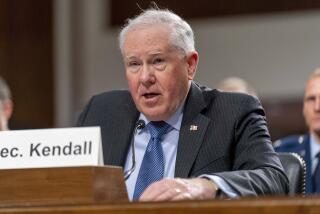Fuel for the Secrecy Addiction
- Share via
Secrecy in government, like nicotine in cigarettes, is perniciously addictive. Virtually anything an official wants to keep secret can be classified, whether or not the information has any real bearing on national security. This is partly bureaucratic habit, partly a deliberate effort to hide information that might expose official failures or prove politically embarrassing. Now Congress, at the behest of the Central Intelligence Agency, has moved to reinforce the government’s propensity for secrecy by imposing criminal penalties on any current or past federal employee who “knowingly and willfully discloses . . . any classified information” to someone not authorized to receive it. This is overreach of the worst kind, and it deserves a presidential veto.
No one disputes the necessity to keep secret some information--nuclear weapons data, the identities of intelligence agents, troop movements in wartime and the like. But Section 304 of the Intelligence Authorization Act, now on President Clinton’s desk, goes well beyond these common-sense classification needs. The measure’s flaws are apparent even within government. Kenneth H. Bacon, assistant secretary of Defense for public information, describes it as “potentially disastrous for government spokesmen.” When virtually everything is classified, then anything said in the course of an official briefing could be construed as violating the proposed law, inviting a three-year prison term.
The secrecy measure was enacted without public hearings and behind closed doors because--naturally--it involved discussion of classified information. If it were to become law the public would be denied access to facts whose release could be essential to informed debate about major defense and foreign policy issues. Whistle-blowers who exposed corruption, lying or other official wrongdoing could be punished. Thoughtful liberals and conservatives in Congress are concerned that this measure could subvert the basic tenets of our open society. They are right. The nation already has strong laws to protect essential secrets. It has no need for new, ill-conceived restrictions that would further curb the public’s right to know.
More to Read
Sign up for Essential California
The most important California stories and recommendations in your inbox every morning.
You may occasionally receive promotional content from the Los Angeles Times.













